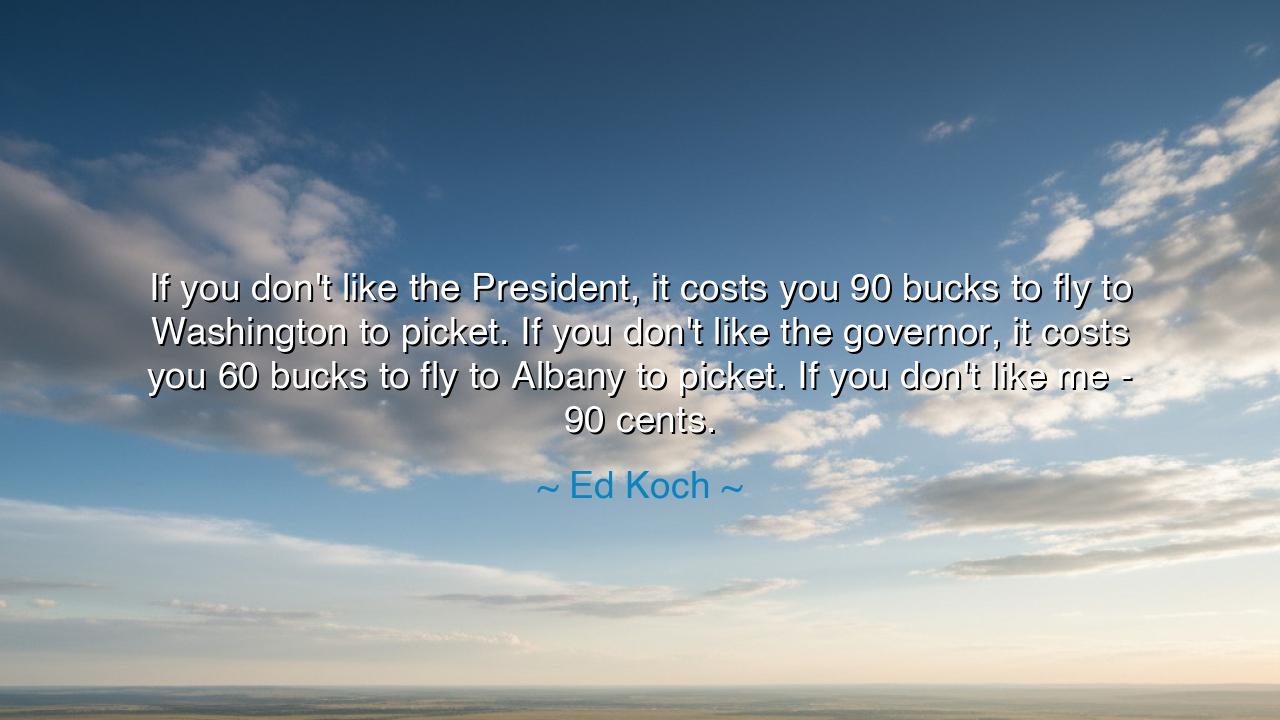
If you don't like the President, it costs you 90 bucks to fly to
If you don't like the President, it costs you 90 bucks to fly to Washington to picket. If you don't like the governor, it costs you 60 bucks to fly to Albany to picket. If you don't like me - 90 cents.






Ed Koch, the fiery mayor of New York City, once quipped with both humor and insight: “If you don't like the President, it costs you 90 bucks to fly to Washington to picket. If you don't like the governor, it costs you 60 bucks to fly to Albany to picket. If you don't like me—90 cents.” In this playful yet profound remark, Koch revealed the raw immediacy of local politics. Unlike the distant figures of national power, the mayor stands among the people, his presence unavoidable, his decisions felt on every street corner, and his accountability always within arm’s reach.
The origin of this saying lies in Koch’s tenure as mayor of New York from 1978 to 1989, a time of financial crisis, urban decay, and fiery confrontations. Koch, known for his sharp tongue and streetwise wit, recognized that while presidents and governors could remain distant symbols, the mayor could never hide. His policies touched the subway, the garbage pickup, the schools, the police—matters that touched the daily bread of every citizen. And so, discontent with him was not abstract but immediate, costing no more than a subway token to voice.
History offers many parallels. In the ancient polis of Athens, citizens could rail against distant kings or generals, but it was the local magistrate, the archon, who bore the brunt of their anger. The people knew where he walked, where he lived, and could confront him in the marketplace. Local leaders have always stood nearest to both the praise and the fury of their people. Koch’s jest, though modern, echoes this timeless truth: proximity magnifies accountability.
The deeper wisdom of Koch’s remark lies in its reminder that democracy lives most vibrantly in the local sphere. It is easy to curse distant rulers, but true participation comes when the people engage with those whose power they can directly touch. The 90-cent subway fare symbolizes not only accessibility, but empowerment—the knowledge that the people can confront, question, and challenge their leaders face-to-face.
Therefore, O seekers of wisdom, remember this lesson: power is not only measured by its grandeur but by its nearness. The President may shape nations, the governor may direct states, but the mayor walks the same streets as the people he serves. The closer the ruler, the greater the voice of the ruled. And it is in this closeness—this daily reckoning—that the spirit of democracy most truly breathes.






HHHello Hello
Ed Koch’s comment is a witty observation about the accessibility of local politicians, contrasting it with the perceived detachment of national figures. It almost suggests that if you have a problem with a local leader, you have an easier and cheaper way to voice your concerns. But does it imply that local leaders have less power or influence to make significant changes compared to their national counterparts?
ANNguyen Hoang An nhien
This quote from Ed Koch makes me think about how much easier it is to engage with local leaders versus national figures. It seems like a nod to the direct influence people can have on their own local politicians. But does it oversimplify the challenge of getting real change, even at the local level? What about the complexities that come with addressing individual complaints within the broader structure of local government?
LPLinh Pham
Ed Koch’s quote plays on the idea of accessibility, making it feel almost like a game of convenience in terms of protesting. But it raises an interesting question: Does proximity to power lead to better accountability, or does it just make leaders more susceptible to populist pressures? In the end, does this kind of constant, easy access help or hinder real progress in local governance?
THPham Thu Hien
Koch’s comment is humorous, yet it seems to suggest a level of ease with which people can protest or challenge local leaders. It’s an interesting contrast between the costs of dissent at different levels of government. But does this accessibility truly reflect the political realities of how much influence the public can have over local versus national leadership? Is the directness of local politics always a good thing, or does it sometimes complicate governance?
VTLe Van Thanh
Ed Koch’s quote is a clever way of highlighting how accessible and responsive a local government official can be compared to higher-level politicians. The idea that you only need 90 cents to voice your discontent suggests that there’s a sense of proximity and accountability with local leadership. But does this simplicity in access come with its own challenges? Does it mean that local leaders have more pressure and responsibility to address their constituents' concerns directly?